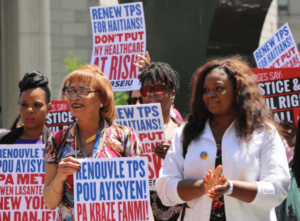
Haitians rally for an extension of temporary protected status. (Credit: Haitian Times)
Slammed by a catastrophic earthquake in 2010 and Hurricane Matthew last year, Haiti remains an island-nation in crisis. Yet, 50,000 Haitian immigrants living in the United States precisely because hunger, disease and crumbling infrastructure that have largely overtaken the country may lose their temporary protected status (TPS) in January.
In 1990, the U.S. government created the TPS program to offer refuge to citizens of countries gripped by war or devastation. The federal government usually grants TPS designations for six-month or 18-month stretches of time, allowing the nationals of countries in crisis to legally work and live in the U.S. Since the deadly 7.0-magnitude earthquake rocked Haiti seven years ago, the government has repeatedly renewed TPS designation for Haitians. In fact, in mid-May, Haitians rallied in Florida to ask the Trump administration to extend their protected status before it ran out on July 22. The immigrants and their allies wanted an 18-month TPS extension, meaning they could remain in the country until January 2019. The Trump administration agreed to extend the TPS designation — but only until January 2018.
Homeland Security Secretary John Kelly explained the decision in a May 22 statement.
“I believe there are indications that Haiti, if its recovery from the 2010 earthquake continues at pace, may not warrant further TPS extension past January 2018,” he said. “TPS as enacted in law is inherently temporary in nature, and beneficiaries should plan accordingly that this status may finally end after the extension announced today.”
In other words, Haitians with TPS designation who’ve made their homes and livings in the U.S. for the past several years should prepare to be uprooted from the country in less than a year. But Haitians say that this timeline is unrealistic and inhumane.
Gerdine Vessagne, a Haitian national with TPS who’s working as a housekeeper in Florida, described how a return to Haiti would likely affect her life.
“I never came to stay for good, but the earthquake happened and I had to stay,” she explained to Rewire. “If TPS is removed, I will not be able to have a place to live, I will not be able to feed my children. I do not know what will happen to my children here in the United States.”
In contrast, Kelly painted a rosy picture of Haiti, pointing out in his statement that he’d carefully reviewed conditions there and found the country had made progress in several areas. He said the country’s economy is growing, and 96 percent of people displaced by the earthquake have left the camps reserved for the victims. He also said that more than 98 displaced-person camps have closed. Lastly, he cited the Haitian government’s plans to rebuild the Haitian president’s residence at the National Palace in Port-au-Prince and the withdrawal of the United Nations Stabilization Mission as signs the country has bounced back from the earthquake that killed upward of 200,000 people.
Charitable Christian organization Food for the Poor paints a startlingly different picture of Haiti, however. Based in Coconut Grove, Fla., Food for the Poor serves Haiti and other countries in the Caribbean and Latin America. On May 4, the charity issued a press release about how more than 500 volunteers from South Florida businesses, churches and community groups came together to raise food for starving children in Haiti. Altogether, volunteers raised food for 124,416 meals, enough to provide food daily to 340 hungry Haitian children for a year.
“The situation is especially dire in Haiti,” according to Food for the Poor. “Since Hurricane Matthew hit in October, much of the country’s livestock, crops and plantings for next year has been wiped out, leaving as many as 400,000 in the Grand’Anse region of southwest Haiti facing a severe food shortage.”
So, why do this charitable group and the U.S. government have such conflicting views of Haiti’s predicament? Critics of the Trump administration argue that the decision to extend TPS for Haitian nationals by just six months reflects the anti-immigrant rhetoric the president has made headlines for since announcing his White House bid two years ago. He suggested then that Mexican migrants who cross the U.S. border are drug traffickers and rapists. And an Associated Press investigation indicates that the Trump administration may be trying to paint Haitian nationals with TPS designation in the same offensive light. The news organization uncovered internal memos from the federal government in which a “top immigration official wanted not only crime data on Haitians who are protected from deportation under the Temporary Protected Status program, but also how many were receiving public benefits.”
These immigrants are forbidden to receive welfare benefits, however.
A DHS spokesperson told the AP that the government would not use the information requested in the memo to make a decision about extending TPS, but only to give Kelly a better understanding about immigrants in the program.
Unite Here organizer Rachel Gumpert said the internal memos show a total disregard of how Haitians have contributed to the country, particularly Florida. “Haitian immigrants have put down deep roots in the United States,” Gumpert told Rewire. “They are gainfully employed, working legally and contributing to their local economies in huge ways. Florida tourism is run by Haitian immigrants.”
Haitians have left such a mark on the Florida tourism industry that the Walt Disney Co. issued a statement urging the federal government to give Haitian nationals a reprieve. More than 500 Disney cast members are Haitian nationals with TPS status. The company called them “an important part of our Walt Disney World workforce in Central Florida.”
With labor unions and a major corporation backing them, it’s clear that these vulnerable Haitian nationals are in no way a drain on the system. Extending TPS designation to them for 18 months rather than a mere six would have benefited these immigrants just as much as it would have the U.S. economy. Sending them back to a country with widespread hunger, cholera outbreaks and lack of housing is not only cruel but unwise. These immigrants, like so many others, aren’t gaming the system. Quite the opposite is true. They’ve helped to better their communities.


